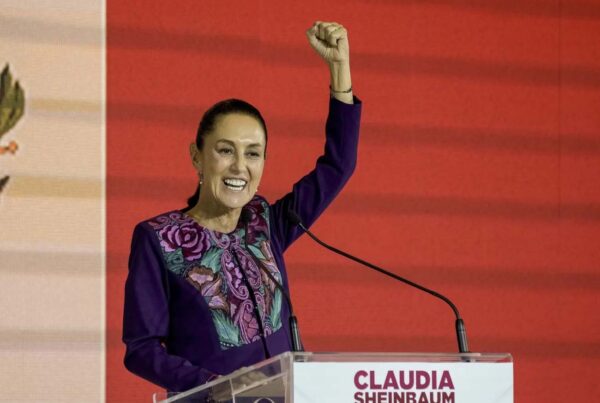Claudia Sheinbaum, an environmental scientist and former mayor of Mexico City, was overwhelmingly elected Mexico’s first female president on Sunday – a historic milestone in a country rife with gender-based violence and misogyny.
Gema Kloppe-Santamaría, an associate professor of Latin American history and international affairs at George Washington University, said this is a big day for Mexico, and for the whole Americas.
“I mean, we have a woman in power in Mexico. We had two leading female candidates,” she said. “That says a lot about all the political, social and cultural transformations that Mexico has undergone.”
Kloppe-Santamaría expects Sheinbaum to continue the policies of her predecessor, Andrés Manuel López Obrador, who is widely seen as Sheinbaum’s mentor and offered her his endorsement during the campaign.
“Sheinbaum both inherits a country with so many challenges. And I would highlight, of course, questions of security, violence, that continues to be a huge challenge. We may be seeing a lot of continuity in terms of security policies,” Kloppe-Santamaría said. “I would say that in terms of migration and as far as it concerns the United States, we might also expect [the government] to continue collaborating with the United States in terms of securing the border there.
“And in terms of trade, I also think we might see continuity. I mean, right now, Mexico is the largest trading partner of the United States. I don’t think that will change.”
However, just because Kloppe-Santamaría expects political continuity doesn’t mean she thinks nothing will change.
“I think the big, big question mark is how the challenges will look under a new leader that doesn’t exactly match López Obrador’s capacity, in terms of his charisma, and how, you know, everything revolves around López Obrador,” Kloppe-Santamaría said. “So I don’t know; there is a lot of uncertainty as well right now.”
» GET MORE NEWS FROM AROUND THE STATE: Sign up for Texas Standard’s weekly newsletters
Many voters listed safety as their top priority, especially for a country where murders of women – known as femicides – remain a serious problem. Kloppe-Santamaría said Sheinbaum’s ability to tackle this issue remains an open question.
“In her inaugural speech she promised that she was going to bring reconciliation to Mexico, that she wants to promote peace. She really wants to bring Mexicans together,” Kloppe-Santamaría said. “It is a huge challenge … we have over 30,000 people killed every year in Mexico. About 11 women are killed every day. We have 100,000 disappearances a year.
“She has the same institutions that [López Obrador] had — the same problems and the same challenges of impunity, of corruption, of criminal collusion on behalf of state actors. She doesn’t have a magic bullet, that’s for sure.”
Kloppe-Santamaría said she expects to see continued pressure from activists in Mexico over militarization in public life.
“I would hope, however, that at least we see from civil society greater pressure for her to at least tell us what is her strategy to curb the participation of the military in public security functions, since that hasn’t really worked and that has actually increased the risk for children, for women,” Kloppe-Santamaría said. “So I hope that she listens to civil society.”
Kloppe-Santamaría said the tone of Mexico-U.S. relations going forward will also depend on the results of the upcoming presidential election in the United States.
“I think that in terms of trade and the economy, I think the prospect is very positive. Despite López Obrador being projecting an image of a populist nationalist, when it came to economic relations, his approach was quite pragmatic,” Kloppe-Santamaría said. “The one aspect that I do see as a point of tension is security. Because the United States has a lot of concern with fentanyl, with the criminal activities of cartels, and so far the security strategy of the government hasn’t been successful.
“And I don’t see a clear path ahead for collaboration, both in terms of improving those security strategies. So I think we will see tension there. And certainly I also expect the government to continue to push the United States to address the question of arms trafficking into Mexico.”













